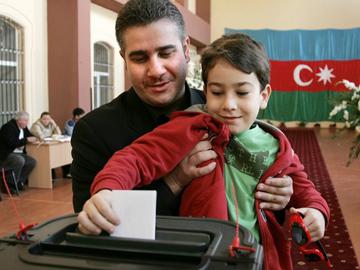
The Religious Factor in Azerbaijani Parliamentary Elections
Publication: Eurasia Daily Monitor Volume: 7 Issue: 194
By:

As Azerbaijan prepares for its next parliamentary elections, scheduled for November 7, many local and international observers are noting the growing role of religion in single-mandate races. A total of 1,412 persons have attempted to register to compete for 125 seats in the highest legislative body of the country, the Milli Majlis. Among these, only 719 are registered while others have been refused registration by election commissions either due to improper documentation or by dropping out of the election entirely.
Although Azerbaijan prides itself on being a secular country where religion and politics are separate, candidates increasingly use religious rhetoric to gain voters’ sympathy and support. In a live TV debate, candidates from one constituency have started arguing over whom the local religious wise man had supported, pointing out to the various pictures taken and telephone conversations held with him. It was obvious that the support of this local clergyman could be a deciding factor in that particular district (Azerbaijan Public TV, October 18). Candidates from another district, located in the center of Baku, have also appealed to religious rhetoric, with one candidate pointing out that he has translated the Koran and another candidate calling her voters “religious people” thus promising them justice and honesty. A candidate from Barda district has even openly accused his opponent, the current Member of Parliament (MP), Zahid Oruc, of being an “infidel,” thus trying to discredit him in the eyes of voters (Azertaj News Agency, October 15).
For an outside observer, Azerbaijan may still seem like much more of a modern country than its more religious neighbors, like Iran, the Russian region of Chechnya or even Turkey. The population, particularly in capital city of Baku, prefers to dress in modern European clothes and follow civil laws as opposed to religious laws. Yet, the surveys and sociological polls in the past few years indicate that a growing number of people, who pray, attend Mosques, observe feasts, and visit Mecca, prefer to live by Islamic norms and laws. This is more the case with young people.
Two young, western educated candidates in the current elections have also pointed out in a private conversation, the growing role of Islam in these elections. They say people have become more religious while many religious organizations and informal institutions have appeared which care take of people and provide welfare services to them. “They are filling the gap which exists due to the inefficient delivery of services by the state,” explained one of the candidates.
Indeed, many analysts and pundits believe that the growing popularity of religion in the country should be attributed to the dissatisfaction among the people caused by the slow delivery of social services in the country. Others point out to the vacuum that exists in the ideological sphere since the collapse of the communism. Democracy and nationalism were popular in 1990’s, but have been discredited by various politicians. For many young people, Islam is the only remaining pure form of just governance in which they believe.
Azerbaijan’s economy has been rising drastically in the past decade, positively affecting the lives of millions of people. Per capita income and GDP have been rising consistently while infrastructure development in the country has reached an unprecedented scale. Yet, the majority of people in rural areas still lack basic utilities and social services. This opens a wide range of opportunities for foreign religious missionaries from Iran, the Gulf States and the North Caucasus to promote Islam and gather young people into their sects (www.day.az, October 20).
Islam’s role in the political life of the country today differs significantly from that of 1990’s, when Islamic parties were established and attempted to openly compete in elections. At that time, the government took decisive measures to break them up and arrest those politicians, who attempted to use religion for political purposes. Today, religion seems to be coming more from the grassroots level, thus pushing the secular politicians to speak with voters in “their language”.
It is unlikely that Azerbaijan will face a religious revolution similar to Iran in 1979. Most of the society and political elite is still committed to the secular nature of the state. Radical Islamic forces are a tiny minority in the country and the majority of believers prefer a soft, non-violent form of Islam. Yet, the growing popularity of Islam might change the nature of Azerbaijani politics in the medium and long-term. Islam could either have a spillover effect from society into politics like it did in Turkey in the past several years under the rule of AKP, or may cause a more violent transformation, similar to Iran. The fact that candidates in the current parliamentary race have started to understand the importance of the religious factor only further supports these trends.




